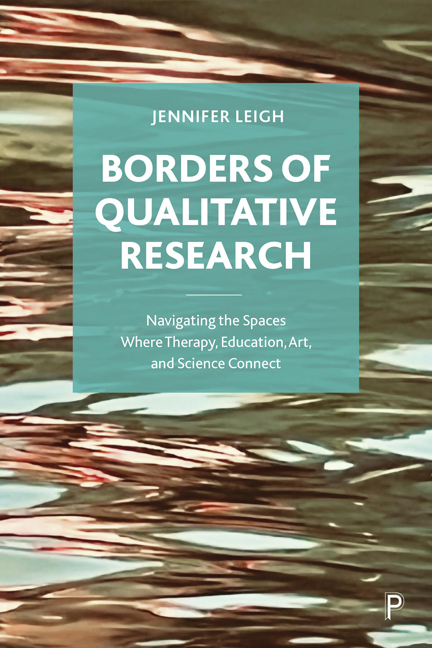 Borders of Qualitative Research
Borders of Qualitative Research Lesson 1 - Reflection
Published online by Cambridge University Press: 28 March 2024
Summary
It is vitally important that a qualitative researcher is self-aware, reflective, and reflexive; particularly one using creative and embodied methods (Leigh and Brown 2021a). Reflection and reflexivity can be used interchangeably, and though they are linked, they are not the same (Leigh and Bailey 2013). Being reflective is the process of looking and examining what is there, how we reacted, or what has happened – the literal act of looking into a mirror – ideally performed without judgement, enhancement, or filters. Reflection is a necessary element of being reflexive, and being consciously self-aware enhances the ability to be reflective. Being reflexive can be understood as the process of reflecting on those reflections, taking into account the context, positionality, and using that insight to act rather than react, and choose what happens next.
I am not a lone voice calling for reflection and reflexivity in researchers. Ian Stronach and colleagues described how reflexivity, and different models of reflexivity are intrinsic to creative methodology in educational, scientific, and artistic research (Stronach et al 2007). Mike Poltorak saw embodied reflexivity as crucial in visual anthropology research and education (Poltorak 2019). Susan Hall stated it is essential in action research (Hall 1996a). Sarah Pink (2007, 2009) and Venus Evans-Winters (2019) saw it as essential to ethnographic research, and Aimee Grant (2018) for documentary analysis. Virginia Braun and Victoria Clarke developed a widely adopted approach to qualitative analysis ‘Reflexive Thematic Analysis’ which demands reflexivity to ensure quality1 (Braun et al 2012, 2019; Braun and Clarke 2013, 2016, 2019, 2021a, 2021b; Clarke and Braun 2019). Amanda Moffat and colleagues believed that reflexivity is key for a researcher’s self-care (Moffat et al 2016). It might seem obvious to say that reflexivity is essential throughout a qualitative research process from design, to data generation, and analysis (Leigh and Brown 2021a). However, Ben Newton and colleagues found that far too often reflexivity is still lacking in qualitative research (Newton et al 2011). The ways in which researchers are supposed to develop reflexivity are ‘hardly discussed’ (Pink 2009: 50). This may be because reflection and reflexivity are seen as hard to teach (Leigh and Bailey 2013), and researchers are lacking the skills they need to reflect effectively.
- Type
- Chapter
- Information
- Borders of Qualitative ResearchNavigating the Spaces Where Therapy, Education, Art, and Science Connect, pp. 21 - 34Publisher: Bristol University PressPrint publication year: 2023


